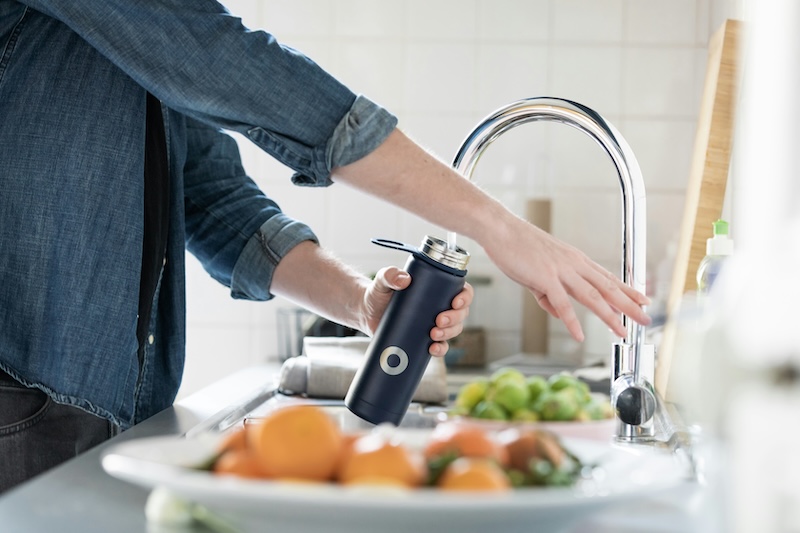Introduction
Titanium is increasingly used in the production of high-quality water bottles and containers due to its unique properties, such as being lightweight, strong, and resistant to corrosion. These characteristics make titanium an ideal material for outdoor enthusiasts, athletes, and anyone seeking a durable, eco-friendly alternative to traditional plastic or stainless steel containers. In this article, we explore how titanium is utilized in the manufacturing of water bottles and containers, its key features, advantages, and why it stands out compared to other materials.
What Is Titanium Material?
Titanium is a lightweight and durable metal known for its excellent corrosion resistance and non-reactivity, which makes it safe for food and beverage storage. It can withstand extreme conditions, making it suitable for both everyday use and outdoor adventures. These properties make titanium an ideal choice for manufacturing water bottles and containers, offering consumers a high-quality solution that ensures safety and longevity.
Features of Titanium Material for Water Bottles and Containers
- Lightweight Construction: Titanium is significantly lighter than stainless steel, making it perfect for portable water bottles. This feature is particularly beneficial for hikers, campers, and athletes who need to minimize the weight of their gear.
- Corrosion Resistance: Titanium does not rust, ensuring that water bottles and containers remain in excellent condition, even after exposure to moisture or harsh environmental conditions.
- Durability: Titanium is extremely resistant to impact and can endure rough handling, making it ideal for outdoor activities and ensuring a long lifespan for water bottles.
- Non-Reactive Surface: Titanium is non-reactive, meaning it does not impart any metallic taste or leach harmful substances into beverages, making it a safe and healthy option for carrying drinks.
- Temperature Retention: Titanium water bottles and containers offer good thermal retention, helping to maintain the temperature of hot or cold beverages for longer periods compared to plastic bottles.
Advantages of Using Titanium Material in Water Bottles and Containers
- Eco-Friendly: Titanium is fully recyclable, contributing to sustainability by reducing the reliance on disposable plastic bottles. Its durability also means fewer replacements, which helps minimize waste.
- Health Safety: Titanium is non-toxic and does not leach chemicals, ensuring that stored food and beverages are safe for consumption. This makes titanium a healthier option compared to plastic, which can release harmful substances over time.
- Lightweight and Portable: Titanium water bottles are much lighter than their stainless steel counterparts, making them easy to carry during activities such as hiking, camping, and sports.
- Durability and Longevity: Titanium water bottles and containers are incredibly durable and resistant to denting and breaking, which means they have a longer lifespan compared to those made from other materials.

Applications of Titanium Material in Water Bottles and Containers
- Outdoor Water Bottles: Titanium water bottles are designed for outdoor enthusiasts, including hikers, campers, and backpackers. Their lightweight nature and durability make them perfect for carrying during long treks and adventures.
- Travel Mugs and Thermoses: Titanium is also used to manufacture travel mugs and thermoses, which benefit from titanium’s excellent temperature retention properties. These containers are ideal for keeping beverages hot or cold for extended periods.
- Food Containers: In addition to water bottles, titanium is used to make food containers that are lightweight, non-reactive, and resistant to corrosion. These containers are perfect for carrying meals during outdoor activities or for everyday use.
- Sports Bottles: Athletes often use titanium sports bottles because of their lightweight nature and resistance to corrosion. Titanium bottles are also free from harmful chemicals, making them a safer option for drinking water during intense physical activities.
Comparison: Titanium Material vs. Other Materials for Water Bottles
- Titanium vs. Stainless Steel: Titanium is lighter than stainless steel, making it more convenient to carry, especially for outdoor activities. While both materials are durable, titanium is more resistant to corrosion and does not impart a metallic taste to the water, unlike some stainless steel products.
- Titanium vs. Plastic: Plastic bottles are lightweight but can leach harmful chemicals over time, especially when exposed to heat. Titanium, on the other hand, is completely non-toxic and much more durable, making it a healthier and longer-lasting choice.
- Titanium vs. Aluminum: Aluminum bottles are lightweight but often require a coating to prevent reactions with acidic beverages. Titanium is naturally non-reactive and does not require any additional coatings, making it a safer choice for storing drinks.
Challenges of Using Titanium Material in Water Bottles and Containers
- Cost: Titanium is more expensive compared to other materials like plastic or aluminum, which could limit its affordability. However, the long lifespan and superior performance of titanium often justify the higher price.
- Manufacturing Complexity: The production and shaping of titanium require specialized techniques and equipment, adding to the overall cost. Titanium is more difficult to machine than other metals, which can make the manufacturing process more time-consuming and expensive.
Future Trends for Titanium Water Bottles and Containers
As consumers become more environmentally conscious and prioritize health and safety, the demand for high-quality, durable, and eco-friendly water bottles is expected to grow. Titanium water bottles and containers are likely to play a significant role in meeting this demand. Advances in manufacturing technology may also help reduce the cost of titanium products, making them more accessible to a wider audience. Additionally, the trend towards reusable and sustainable products will continue to drive the popularity of titanium as a material for water bottles and containers.
FAQs about Titanium Material in Water Bottles and Containers
- Why is titanium a good choice for water bottles?
- Titanium is lightweight, durable, corrosion-resistant, and non-reactive, making it an ideal material for water bottles.
- How does titanium compare to stainless steel for water bottles?
- Titanium is lighter, more corrosion-resistant, and does not impart a metallic taste to water, whereas stainless steel is heavier but also durable.
- Are titanium water bottles safe for hot beverages?
- Yes, titanium is safe for hot beverages and provides good thermal retention without releasing harmful chemicals.
- Is titanium better than plastic for water bottles?
- Yes, titanium is non-toxic, does not leach harmful chemicals, and is much more durable compared to plastic.
- Can titanium water bottles be used for acidic beverages?
- Yes, titanium is non-reactive and safe for storing acidic beverages like juice or sports drinks.
- Why are titanium water bottles more expensive?
- The cost of titanium as a raw material and the complexity of the manufacturing process make titanium water bottles more expensive.
- Are titanium water bottles dishwasher-safe?
- Yes, most titanium water bottles are dishwasher-safe due to their high resistance to heat and corrosion.
- How does the weight of titanium compare to aluminum for water bottles?
- Titanium is slightly heavier than aluminum but offers greater strength and durability without needing a protective coating.
- Can titanium containers be used for storing food?
- Yes, titanium containers are safe for storing food as they are non-toxic, non-reactive, and resistant to corrosion.
- Do titanium water bottles retain the taste of previous drinks?
- No, titanium is non-porous and does not retain flavors, making it easy to switch between different beverages.
- Is titanium environmentally friendly?
- Yes, titanium is a sustainable material that is fully recyclable, making it an environmentally friendly choice.
- Are titanium bottles suitable for sports use?
- Yes, titanium bottles are lightweight, durable, and free from harmful chemicals, making them ideal for athletes.
- How long do titanium water bottles last?
- Titanium water bottles are extremely durable and can last for many years, making them a long-term investment.
- Can titanium water bottles be used in extreme temperatures?
- Yes, titanium can withstand both high and low temperatures, making it suitable for a variety of environments.
- Why choose titanium over other materials for outdoor activities?
- Titanium’s lightweight, strength, and resistance to rust and corrosion make it perfect for outdoor activities where durability and portability are essential.
Conclusion
Titanium material is an excellent choice for the manufacturing of water bottles and containers due to its lightweight, durable, and non-toxic nature. While it may come with a higher price tag compared to other materials, the long-term benefits of safety, durability, and environmental sustainability make titanium an attractive option for those seeking high-quality drinkware. As consumer preferences shift towards reusable and eco-friendly products, titanium water bottles and containers are set to become increasingly popular in the years to come.






